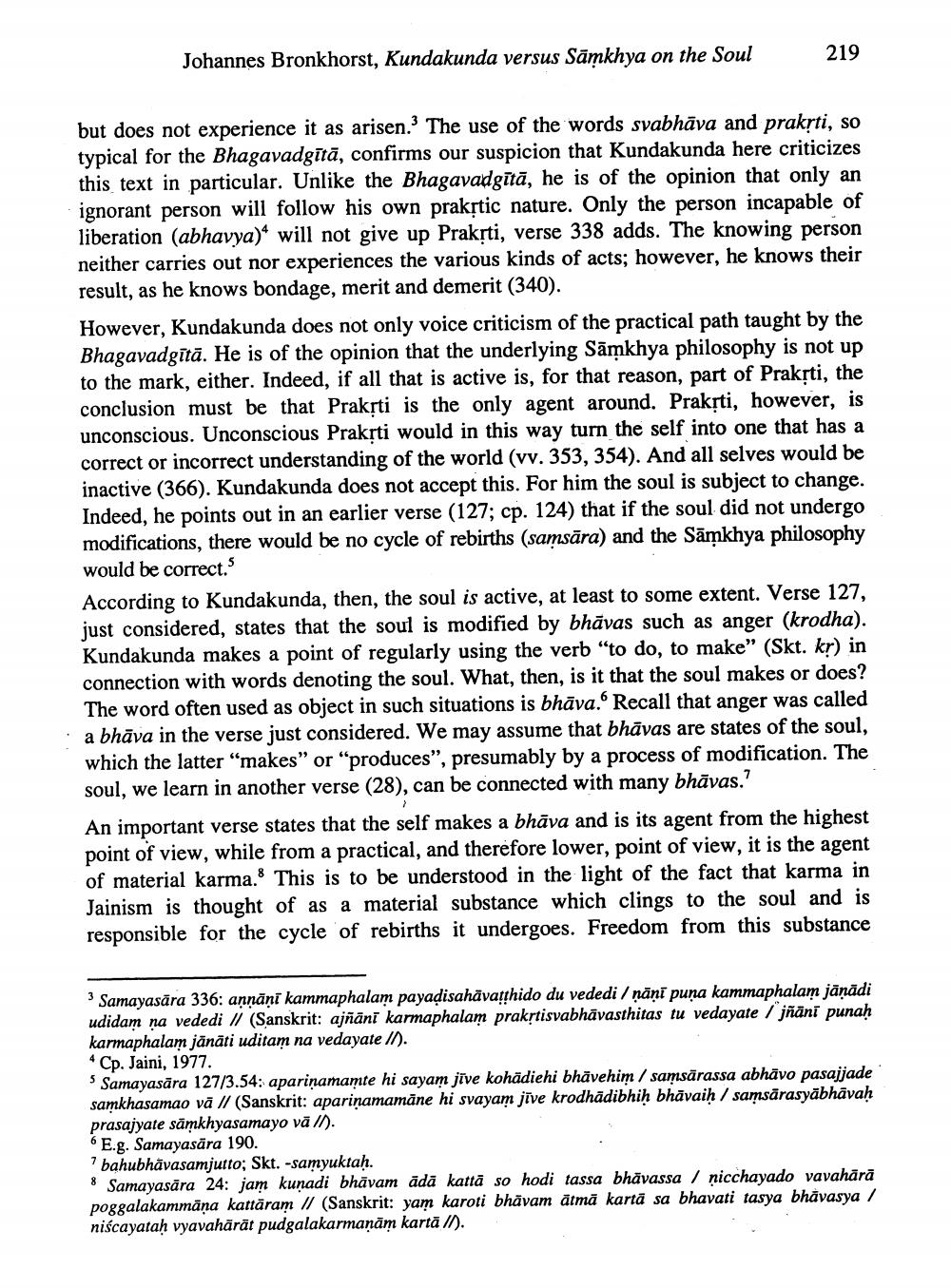________________
Johannes Bronkhorst, Kundakunda versus Sāmkhya on the Soul
219
but does not experience it as arisen. The use of the words svabhāva and prakrti, so typical for the Bhagavadgītā, confirms our suspicion that Kundakunda here criticizes this text in particular. Unlike the Bhagavadgītā, he is of the opinion that only an ignorant person will follow his own prakrtic nature. Only the person incapable of liberation (abhavya)" will not give up Prakrti, verse 338 adds. The knowing person neither carries out nor experiences the various kinds of acts; however, he knows their result, as he knows bondage, merit and demerit (340). However, Kundakunda does not only voice criticism of the practical path taught by the Bhagavadgītā. He is of the opinion that the underlying Sāmkhya philosophy is not up to the mark, either. Indeed, if all that is active is, for that reason, part of Praksti, the conclusion must be that Praksti is the only agent around. Prakệti, however, is unconscious. Unconscious Praksti would in this way turn the self into one that has a correct or incorrect understanding of the world (vv. 353, 354). And all selves would be inactive (366). Kundakunda does not accept this. For him the soul is subject to change. Indeed, he points out in an earlier verse (127; cp. 124) that if the soul did not undergo modifications, there would be no cycle of rebirths (samsāra) and the Sāmkhya philosophy would be correct.' According to Kundakunda, then, the soul is active, at least to some extent. Verse 127, just considered, states that the soul is modified by bhāvas such as anger (krodha). Kundakunda makes a point of regularly using the verb "to do, to make" (Skt. kr) in connection with words denoting the soul. What, then, is it that the soul makes or does?
The word often used as object in such situations is bhāva. Recall that anger was called • a bhāva in the verse just considered. We may assume that bhāvas are states of the soul,
which the latter “makes" or "produces”, presumably by a process of modification. The soul, we learn in another verse (28), can be connected with many bhāvas. An important verse states that the self makes a bhāva and is its agent from the highest point of view, while from a practical, and therefore lower, point of view, it is the agent of material karma. This is to be understood in the light of the fact that karma in Jainism is thought of as a material substance which clings to the soul and is responsible for the cycle of rebirths it undergoes. Freedom from this substance
Samayasāra 336: annāņi kammaphalam payadisahāvathido du vededi /ņānī puna kammaphalam jāņādi udidam na vededi // (Sanskrit: ajñāni karmaphalam prakstisvabhāvasthitas tu vedayate / jñāni punaḥ karmaphalam jānāti uditam na vedayate //). * Cp. Jaini, 1977.
Samayasāra 127/3.54: aparinamamte hi sayam jūve kohädiehi bhāvehim/samsārassa abhāvo pasajjade samkhasamao vā // (Sanskrit: apariņamamāne hi svayam jīve krodhādibhih bhāvaiḥ / samsārasyābhāvah prasajyate sāmkhyasamayo vā //).
E.g. Samayasāra 190. bahubhāvasamjutto; Skt. -samyuktaḥ. 8 Samayasāra 24: jam kunadi bhāvam ādā kattā so hodi tassa bhāvassa / nicchayado vavahārā poggalakammāņa kattāram // (Sanskrit: yam karoti bhāvam ātmā kartā sa bhavati tasya bhāvasya / niscayataḥ vyavahārät pudgalakarmanām kartā //).




